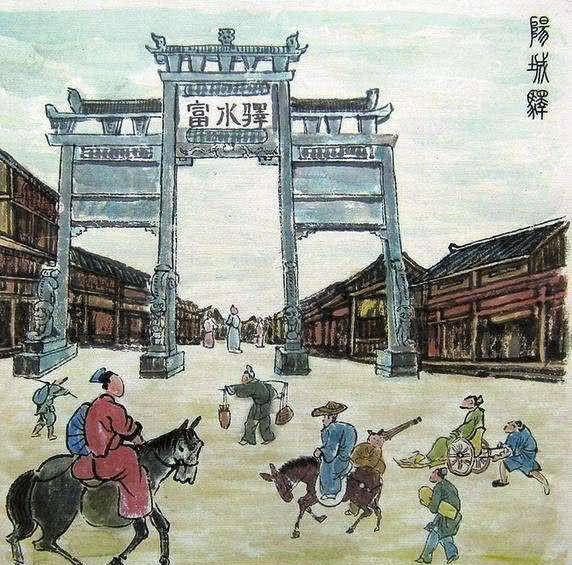In the Song Dynasty, there were official roads between states and counties, and the official roads were also called official roads; The official road of Tongyi chuan is also called yilu and post road, usually most of the official roads are post roads, and the main trunk line is often called Da Yi Road and Da Lu.
The most famous Dayi Road, such as "entering the Chuan Road, from Fengzhou (present-day Fengzhou Town, Northeast Fengzhou, Fengxian County, Shaanxi) to Lizhou (present-day Guangyuan, Sichuan), Jianmenguan (present-day North jiange, Sichuan), straight into Yizhou Road". Usually from the capital to the capital (similar to the capital of the province), there are large stations to facilitate the rapid transfer of documents.
Most of the sides of the Yilu and Guanlu roads were planted with street trees and drainage ditches dug, and in the third year (1113) of the late Northern Song Dynasty, an edict was issued: "All over the Yilu Road and the banks of the Tongzhou and County Guanlu Roads, plant trees such as fir, pine, holly, and willow." Subsequently, various localities declared that "a total of 338,600 trees were planted to the fir, pine and other trees, which gradually grew and grew, and have been placed under custody."
And in accordance with the official mountain forest law management, without the approval of the government " loggers, staff eighty" . Those who report the cutting down of sidewalk trees without permission can receive a reward of twenty dollars (equivalent to two or two, about 60 grams of gold).
The Government of the Northern Song Dynasty began at the latest in the fifth year of Dazhongxiangfu (1012) to "plant elm willows in time along the Bianguan Road" in Hebei. Later, it was constantly required to plant street trees in various places, but it was not until the late Northern Song Dynasty that there was a decree severely punishing the illegal cutting of street trees.

In the Song Dynasty, there were "堠子", that is, milestones, every ten or five miles next to the post road and the official road, so the distance between the states, the capitals and the capital were more accurately recorded (see the "Yuanfeng Nine Domains Chronicle").
In the Song Dynasty, there was a post station every forty miles or so along the post road (the waterway was set up as a one-day voyage), and the distance between the two stations was called a post, or a station, a ride. Due to the geographical environment, sometimes a journey is fifty or sixty miles; A very small number of them amount to seventy miles, and usually a post station is added in between.
The post stations of the provinces, prefectures and counties are often called post offices; Rural caravanserais are usually located in towns and cities, and only a few are located in deserted locations. The post station has a pavilion for the accommodation of incumbent and departing officials, and the road, prefectural, and governors also live in the "line" (inspection) in the jurisdiction.
For example, the famous poet Yang Wanli of the Southern Song Dynasty served as the deputy envoy of Jiangnan East Road in the first year of Shaoxi (1190), and went south to "Xingbu" in August of the following year, staying at Moling Yi (present-day Moling Pass, Nanjing, Jiangsu) on the first day, Staying in Wushan (northwest of present-day Lishui, Jiangsu) the next day, and "sending Wushan into Lishui County (inside the city)" on the third day, which is an example.
The officers and men of the "Gang Yun" and the officials and pawns who have been sent out can also stay at the post with the "ticket" and stay first, but usually the low-ranking officials must let the high-ranking officials who arrive later, especially the high-ranking officials of the direct lineage. During the Northern Song Dynasty, officials in the north often took "horses" to take up posts and "line departments"; southern officials took boats on water and "eaves" on the ground; in the Southern Song Dynasty, when they took palanquins, and when Yang Wanli "traveled to the ministry", "people reported to officials to come to see, and cattle were suddenly shocked when the car passed", indicating that there were not many palanquins in the countryside.
The post station also allowed "the house of the pinguan, and the lieutenants who did not enter the official, although they did not ask for (post) tickets, and listened to the Song Dynasty "post" did not have horses, the officials rode the "stagecoach" with the "head of the horse", which was actually the "horse delivery" of the "horse delivery shop".
The post station is only an "official brigade" that provides accommodation services, only for officials and their families to live, here "non-official" refers to the nine pins below, "school lieutenant" is a low-level military attaché without quality, "Jinyi school lieutenant" below to "shou lack jin yong deputy lieutenant" eighth rank, still belongs to the official.